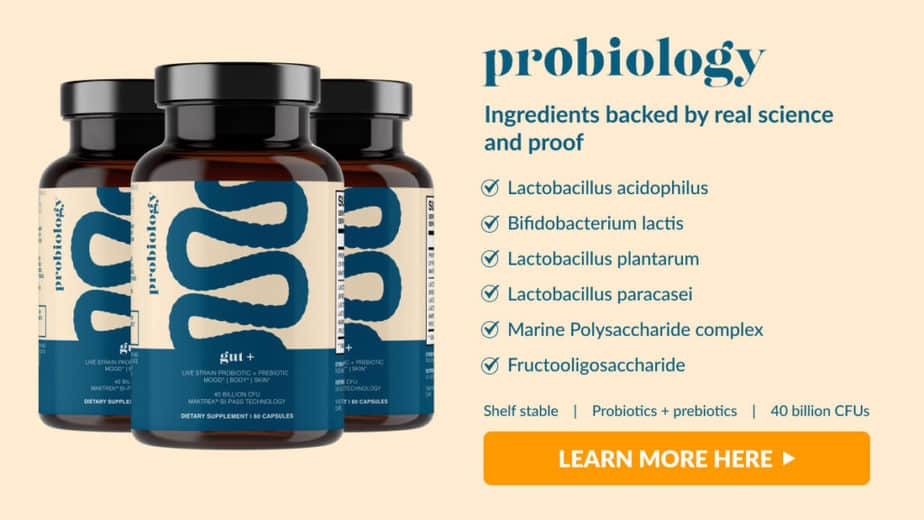Constipation can be nasty business. You can feel stuffed up, full, bloated or even nauseous. The worst part is that there is so much information online telling you how to get rid of it.
Drink more water, exercise, drink coffee, or take laxatives…it can leave you feeling fed up and not knowing what to do next.
Another suggestion for constipation treatment relief is probiotics. Probiotics are a type of good bacteria that can aid and heal the digestive system, so you may be wondering…will probiotics help you poop?
This guide is going to look into all the facts to help you find out! But, first let’s examine what constipation actually is, and what causes it.
What Exactly Is Constipation?
In the most basic sense, constipation is when you have a disorder in the gastrointestinal tract, which can produce infrequent stools, hard and dry stools, or difficulty passing stools. This can result in pain when going to the toilet.
What this means is that when you are constipated, you may find that you poop much less often, and when you do it can be painful, and you may feel that you are straining to poop. Sometimes you might feel that you haven’t completely emptied things out.
All of these symptoms can create a lot of discomfort, especially as constipation can go on for days or months, or even years.
After a while, you may feel fed up! If the symptoms persist for more than 6 months, or happen more frequently, then it could be chronic constipation. So, what causes this illness?
What Is The Cause Of Constipation?
Constipation can be caused by a variety of factors. For most people, constipation is a result of not drinking enough water, moving enough, and not getting enough fiber such as fruits and vegetables.
Other reasons could be stress, anxiety, depression, or even travel. In addition, if you change your diet or daily routine, it can have an effect on your body, and can make you constipated.
- Related article: What are Good Fiber Foods
Constipation can also be common if you are on certain medications, or if you are pregnant.
For the most part, constipation is actually caused by an imbalance in your gut. What this means is that the bacteria in your microbiome is not right.
The phrase microbiome is used to refer to the range of microorganisms living inside of your body in your gut. These keep your gut healthy.
These bacteria can help you digest food, regulate your immune system and create nutrients for your gut to keep you strong and healthy. It’s not like the pathogenic bacteria you have been taught to fear and avoid due to their disease causing abilities, rather they are called good bacteria.
When too much bad bacteria builds up in your gut, it can make you feel unwell, and can upset the delicate balance of your digestive system. Good bacteria are there to restore that balance.
However, if you have too much bad bacteria, then you will have an imbalanced microbiome, which is called ‘dysbiosis.’ When this happens, you may experience constipation.
So, how do you restore the good bacteria, and get rid of the bad bacteria so you can feel healthy again? Well, more and more people are suggesting probiotics to improve your gut health. Let’s find out what these are in more depth.
What Are Probiotics?
Probiotics are essentially live bacteria that are good and healthy for you (good bacteria). These can aid the digestive system and reduce digestive problems. Probiotics provide many benefits in different forms.
You can find probiotics in supplements and foods such as yogurts. Probiotics are often used to replace good bacteria in your body if you have lost some due to illness, or in case you have more bad bacteria in your body than usual.
The World Health Organization describes probiotics as ‘live microorganisms which when consumed in adequate amounts as part of food confer a health benefit to the host.’ In the simplest terms, probiotics are good bacteria.
- Related Articles: Kombucha vs Yogurt vs Probiotic Supplements
- Is Yogurt Good for IBS?
What Do Probiotics Do?
Probiotics are designed to replenish your gut with good bacteria. For instance, if you swallow a probiotic capsule, you are taking in millions of helpful and healthy bacteria, which will go straight to your gut to rebalance your microbiome.
Not only does this mean that good bacteria is back in your gut, but it also means that probiotics drive bad bacteria away, and return your microbiome to good health.
As probiotics are used to restore good bacteria to the body, and constipation is caused by bad bacteria, let’s find out if you can use probiotics to ward off the symptoms of constipation.
Can Probiotics Help Ease Constipation?
There is a lot of contradicting evidence whether probiotics can ease constipation and make you poop. Some studies show that probiotics are a helpful aid for constipation, where others show that they do not have a whole lot of effect.
One study shows that patients who consumed probiotics saw a 70% improvement in their stool frequency, and a 60% improvement in the consistency or form of their stools. However, this study only had 30 participants, and would need a wider survey for conclusive results.
Other studies suggest that using probiotics to treat constipation creates a placebo effect, and does not actually treat the symptoms of constipation.
Another research study was conducted to test the effectiveness of probiotics for the symptoms of constipation with a sample size of 75 people, over the period of 4 weeks.
In this study, there was a control group who took the probiotics and a group that did not. After the study was over, there was seemingly no difference in the stools, symptoms or quality of life for the group that took the probiotics.
What this suggests is that there are mixed reviews of using probiotics as a treatment for constipation, and its effectiveness is not completely assured.
However, this could be due to the fact that different studies use different probiotics. What works for one person may not necessarily work for another.
This is why many scientists and researchers believe that more studies and tests should be conducted using different strains of probiotics, to test their effectiveness and productivity in treating constipation.
To summarize, using probiotics may help ease constipation, but it also may not. It depends which ones you use, as some may work for you whereas others may not.
What Are Prebiotics?
So what about prebiotics? Prebiotics are slightly different as they are considered a substrate that is utilized by host microorganisms for a health benefit.
In simpler terms, prebiotics are types of food that are good for your good gut bacteria that are already in the gut, and can help increase the good bacteria and improve your overall health and wellbeing.
What Do Prebiotics Do?
Prebiotics are a little different from probiotics, as prebiotics are used to feed your good bacteria that is already in your body.
By feeding and nourishing this good and beneficial bacteria, it is able to multiply, which will make you feel healthier and improve your immune system and digestive system.
The benefits of prebiotics are a strengthened digestive system and intestinal lining, decreased inflammation, and more efficient removal of toxins from the digestive tract.
Just like probiotics, prebiotics are used to balance your gut bacteria, and improve the microbiome.
Probiotics vs Prebiotics: How Are They Different?
If you read the terms quickly, they kind of look the same and blur into one, but what’s the difference? Well, probiotics are actual live bacteria that you put into your body, whereas prebiotics feed the bacteria in your body.
- Read More: Prebiotics vs Probiotics In-Depth
When you use probiotics, you are actively adding good bacteria into your body to balance out an influx of bad bacteria. On the other hand, with prebiotics, you are adding fuel for the good bacteria already in your body.
By adding in good bacteria (probiotics) and giving them the fuel they need (prebiotics) to grow, multiply and balance the microbiome, you can restore your gut health.
Probiology contains probiotics and prebiotics in one with 40 billion CFUs.

Can Prebiotics Help Ease Constipation?
There is a lot of research behind whether prebiotics can help ease constipation, and the majority of it supports that prebiotics can improve bowel regularity and ease constipation.
Studies show that prebiotics are able to improve constipation symptoms, and assist you in passing stools. In much of this research, prebiotics are shown to increase stool frequency, and improve the consistency, making it easier to poop and for the constipation symptoms to pass.
That being said, some of the greatest and most successful treatments for constipation are when you use prebiotics and probiotics combined.
Together, they are called synbiotics, which are most productive in helping you poop and easing your constipation symptoms.
Research shows that using synbiotics can dramatically decrease gut transit time, which is how long it takes between eating food and having a bowel movement.
This time can be reduced by 13.5 hours on average, meaning that you can pass stools far more frequently.
These synbiotics also improve the consistency of the stools, making them easier to pass without discomfort, pain or bloating.
Probiotics Helping You Poop Final Thoughts
Probiotics can help you poop, so don’t be afraid to trake them if you’re feeling constipated.
However, most research suggests that the best results happen when combining probiotics with prebiotics, as this is an effective way to ease constipation and reduce the symptoms.
Here are some other articles that you might be interested in:

